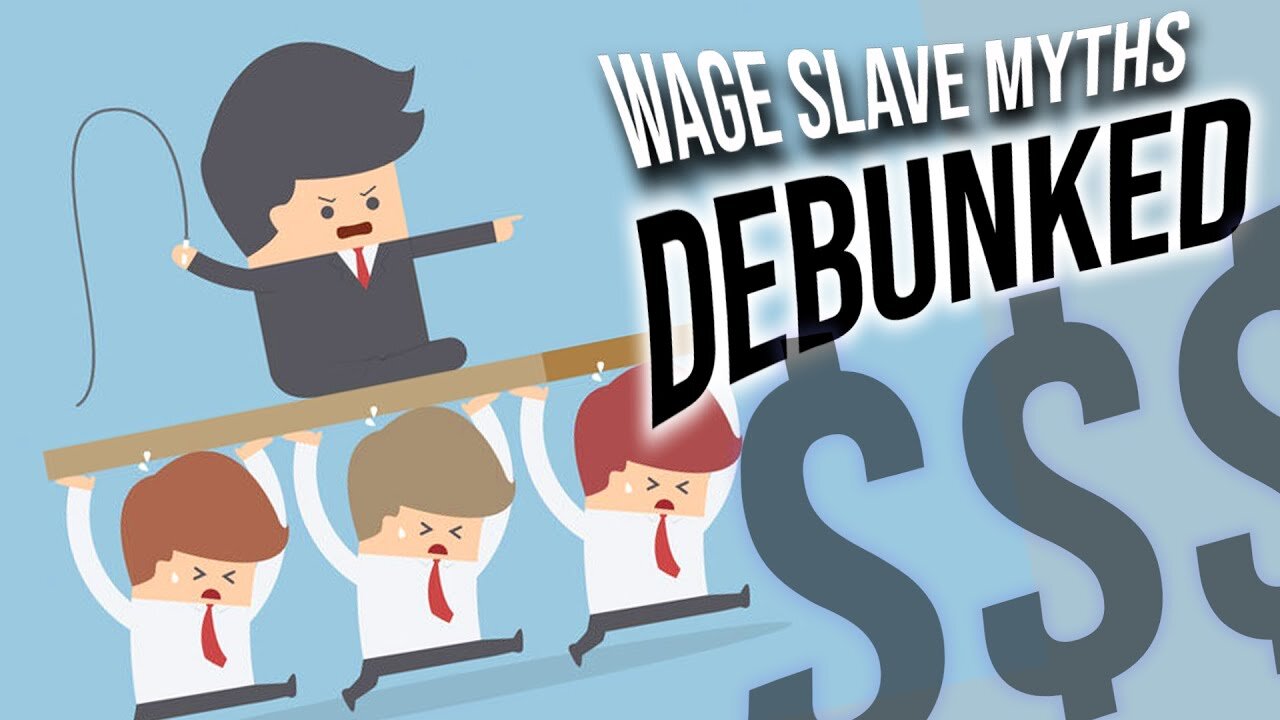Premium Only Content

Debunking Common Leftists "Wage Slave" Tropes
Become a monthly contributor http://yaronbrookshow.com/support This video was created by Christian Jackson. Taken from YBS: "Wage Slavery" Streamed live on Jun 15, 2021 You can see the full video here https://bit.ly/35BSq75
#WageSlave #Leftists #Socialism
Like what you hear? Like, share, and subscribe to stay updated on new videos and help promote the Yaron Brook Show: https://bit.ly/3ztPxTx
Become a sponsor to get exclusive access and help create more videos like this: https://bit.ly/2TCEqHc
Or make a one-time donation: https://bit.ly/2RZOyJJ
Continue the discussion by following Yaron on Twitter (https://bit.ly/3iMGl6z) and Facebook (https://bit.ly/3vvWDDC )
Want to learn more about Ayn Rand and Objectivism? Visit the Ayn Rand Institute: https://bit.ly/35qoEC3
Transcript: His worker is not staying poor. His worker is rising in his wages over time as he becomes more productive. If you look at the life cycle of workers ... yes, they start with very weak wages but their wages increase as they become more productive ... as they switch jobs, as they become more senior, as they develop more skills. If you're a decent worker, you Don't Stay Poor. Part of the problem with poverty numbers is that they're weighted by the fact that when you're young, almost everybody is poor. Because you don't know anything and you don't have any skills. Now, the employer is not sharing his profit with the workers. But Why should he. The profits are Compensation for the employer, for the capital he has put up, for the risk he has taken, for the time he puts in to sustain the business --- it is His form of compensation. The workers' compensation is wages, and wages are received Before the owner receives his profit. What about years when there's no profit? What about years where the profit is negative and there's a loss, and the employer actually has to dig into savings? Sometimes workers lose their job, but sometimes they don't. And rarely do their wages get cut. Profit is the Return On Investment. It's compensation for the investment, and compensation for the time value of money. The fact that the investor doesn't have the money and is giving it to You, the worker and all the different workers from the CEO on down. It's compensation for the risk he has taken, and it's compensation for his ability to choose You over somebody else. It's his opportunity. So, why should the employer share the profits with the worker? Is he gonna share the losses as well? ... The reason a CEO gets compensated for a profit, the reason his salary is often linked to the company's profits, is because He more than anyone else in the company responsible for those profits. He, if he makes the right calls, will cause the company to make money; if he makes the wrong calls, he will cause the company to lose money. So it's really, really important that he make the right calls. It's his ability that will determine the fate of the company. If a worker screws up here or there, it's not gonna change that much in terms of the profitability of the company. But if the CEO screws up here or there, it's gonna make a Huge difference. So he gets compensated from profits because of the impact he has on profits. Since any given worker has very little effect on profits, he gets very little compensation from profits. Now, there are companies today that Do pay their workers from profits. They give them bonuses, stocks, sometimes stock options. The barista at Starbucks might get a bonus at the end of the year, but he does not have a big effect on profits. So why should he make profits?
-
 0:06
0:06
Animation Station
4 years agoCommon Ground Outro 3
291 -
 0:30
0:30
Globalogna
4 years agoCommon Ground Outro
231 -
 0:16
0:16
Globalogna
4 years agoCommon Ground Intro
28 -
 0:06
0:06
Animation Station
4 years agoCommon Ground podcast 4 Outro
33 -
 0:33
0:33
New York Post
4 years agoCommon Covid symptoms changed
8547 -
 LIVE
LIVE
SpartakusLIVE
2 hours agoWZ Solos ONLY - Everything Else: BANNED || NEW Schedule Experiment
785 watching -
 LIVE
LIVE
xLuigi34x
2 hours ago100 Follower Special! Going to 100% The DKC Trilogy on stream!
335 watching -
 LIVE
LIVE
LumpyPotatoX2
2 hours agoHostile Takeover | High-Stakes PvP - #RumbleGaming
184 watching -
 DVR
DVR
LadyDesireeMusic
2 hours ago $17.77 earnedCooking Stream | Make Ladies Great Again
36.1K5 -
 2:03:42
2:03:42
The Connect: With Johnny Mitchell
1 day ago $27.90 earnedAmerican Vigilante Reveals How He Went To WAR Against The WORST Cartels In Mexico
110K13